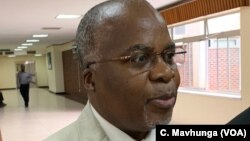The Zimbabwean government, which is facing a crippling industrial action by doctors working in state hospitals, is planning to haul hundreds of doctors before the Labor Court in an effort to end the 35-day strike initiated by junior doctors, earning less than US$200, who are demanding better salaries and improved working conditions.
The strike has been joined by some specialists, senior and middle-level doctors that are making similar demands. According to Dr. Paulinus Sikosana, chairperson of the Health Service Board which employs doctors, their move to walk away from negotiations following a state offer of a 66 percent cost of living adjustment, prompted the Ministry of Health to take the matter to the Labor Court.
In an interview with VOA Zimbabwe Service, Dr. Sikosana said the Labor Court has to make a determination by Tuesday on the legality of the doctors’ industrial action.
“In terms of the labor law that governs health worker employees, if they are not at work for more than five days we have to take the legal action in terms of the Labor Act and the Minister of Public Service, Labor and Social Welfare has already issued a show cause order and there will be a hearing Tuesday which will determine whether the job action is legal or illegal and we will take it from there in terms of the provisions of that Labor Act …
“We have been negotiating since last year. The rest of the civil service, the rest of the health workers have conceded … This is an interim agreement in which the government offer has been accepted by all the health workers on the condition that this is not the end of all negotiations of cost of living adjustments and the agreement is premised on fact that we will continue with the negotiations. We can’t say it’s an unfriendly way of resolving the issue that concerns the doctors.”
Dr. Sikosana said all striking doctors are expected to report for work Monday.
“Negotiations at the time being have been concluded. We have a collective bargaining agreement with the health workers during which negotiations the doctors decided that they would unproceedurally walk out of the negotiations before they were concluded. So, the issue now, the way forward is that there is an agreement all health workers are expected to be back at work by tomorrow 8 oclock.
“The majority of the workers are at work. All the consultants and the specialists at the United Bulawayo Hospitals are at work, all the consultants at Mpilo Central Hospital are at work and have been at work. The consultants at Harare Central Hospital who had been put on the duty rosters, they were at work. The problem that we have been having is specialists and senior doctors at Parirenyatwa Hospital. In terms of the middle management and middle doctors and junior doctors, interns who are just from the universities they have continued not to come to work.”
Asked if this is the correct route to take in order to stop the crisis, Dr. Sikosana said, “The rule of law basically … We have been negotiating since last year. The rest of the civil service, the rest of the health workers have conceded and we continue, this is an interim agreement in which the government offer has been accepted by all the health workers on the condition that this is not the end of all negotiations of cost of living adjustments and the agreement is premised on fact that we will continue with the negotiations. We can’t say it’s an unfriendly way of resolving the issue that concerns the doctors.”
He noted that junior doctors are not supposed to engage in industrial action as they are still undergoing training in state hospitals.
“You must recall that junior doctors are on contract and that contract actually prohibits them, they are still in training, you should be aware of that … A person in training decides that they will walk away from their responsibilities, how do you expect the employer respond when they have been given an opportunity for negotiations. Its only last week that we had an engagement with them, we met with them. So, I don’t know what you expect the employer to do at the end of a month when your employees are not coming to work while they are opportunities for negotiations which they refused to participate in."
But Dr. Masimba Ndoro, spokesperson for the Zimbabwe Hospital Doctors Association, said the government does not need to take this matter to the Labor Court.
“It’s up to them to take such action but that’s not the best way of doing things. As far as we are concerned we have not yet reached any agreement with the government over our call allowances, salaries and other issues.”
Some patients are being turned away at government officials with a large number of patients having serious ailments.
Dr. Sikosana said in the face of this crisis in hospitals, some of the institutions have merged certain wards that deal with related conditions in order to take care of patients’ needs.




